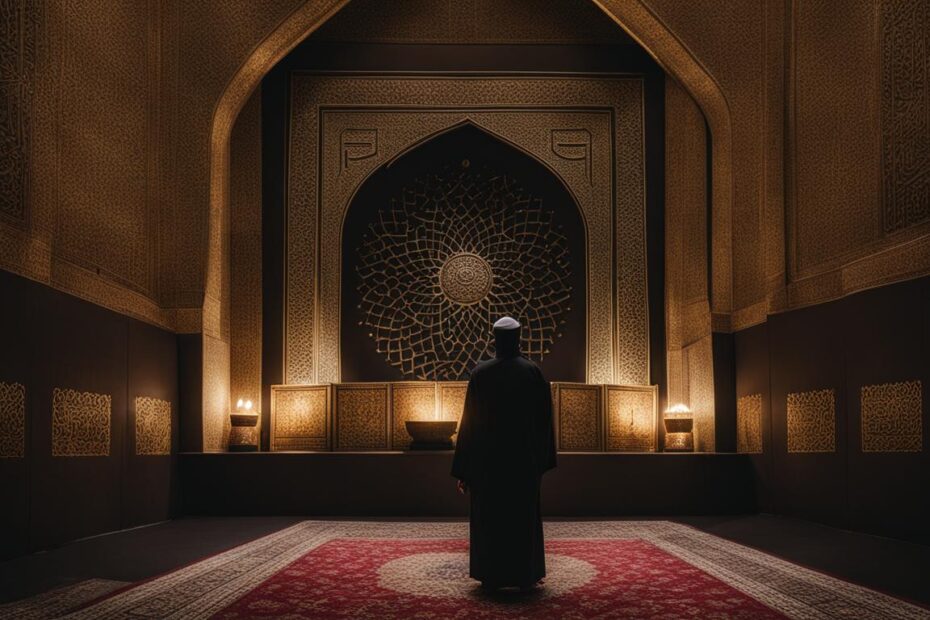Tahajjud prayer is a voluntary prayer that holds great significance in Islam. It is not obligatory, but many devout Muslims choose to incorporate it into their daily routine as a sign of devotion and an opportunity to earn redemption from Allah. This article will provide a step-by-step guide on how to pray Tahajjud prayer, allowing you to enhance your spiritual connection and reap the numerous benefits associated with this special prayer.
Key Takeaways:
- Tahajjud prayer is a voluntary prayer in Islam.
- It is performed to seek closeness to Allah and earn redemption.
- Prayer timings for Tahajjud are after Isha and before Fajr.
- Making a sincere intention is essential before starting the prayer.
- Performing Wudu (ablution) is necessary for Tahajjud prayer.
The Importance of Tahajjud Prayer in Islam
Tahajjud prayer holds great significance in Islam and is highly regarded for its spiritual importance. It is mentioned in the Quran as an additional form of worship that brings the worshipper closer to Allah. The Prophet Muhammad (PBUH) emphasized the significance of Tahajjud prayer by calling it the best prayer after the obligatory prayers.
By engaging in Tahajjud prayer, Muslims have the opportunity to earn rewards, seek forgiveness, and strengthen their faith. It is a voluntary prayer that demonstrates devotion, commitment, and a desire to connect with Allah on a deeper level. Through the act of waking up in the middle of the night and dedicating oneself to prayer, Muslims demonstrate their love for Allah and their willingness to go above and beyond the obligatory acts of worship.
Praying Tahajjud also allows individuals to seek forgiveness for their sins and seek blessings from Allah. It is a time when one can reflect on their actions, seek repentance, and ask for guidance and mercy. The quiet and solitude of the night provides an ideal environment for introspection and deep connection with Allah.

Benefits of Tahajjud Prayer
Tahajjud prayer offers numerous benefits to those who engage in it. It helps in strengthening one’s relationship with Allah and deepening their faith. By regularly waking up for Tahajjud prayer, individuals develop a sense of discipline, self-control, and devotion that extend to other aspects of their lives.
- Tahajjud prayer brings inner peace and tranquility to the worshipper, allowing them to find solace in the remembrance of Allah.
- Praying Tahajjud can also help in controlling desires and impulses, as it requires sacrificing sleep and comfort.
- It is believed that Tahajjud prayer can bring light to one’s face and soul, signifying the purification and enlightenment of the heart.
- Engaging in Tahajjud prayer allows individuals to seek forgiveness, repent for their sins, and seek Allah’s blessings.
- Tahajjud prayer also helps in strengthening the love for the Hereafter and reminding worshippers of the fleeting nature of this world.
By regularly performing Tahajjud prayer, individuals can experience spiritual growth, find peace in their hearts, and establish a deeper connection with their Creator.
The Time for Tahajjud Prayer
Tahajjud prayer is a voluntary prayer that offers a special opportunity for Muslims to connect with Allah and seek His blessings. It can be performed after the Isha prayers and before the Fajr prayers. While there is no specific time prescribed in the sacred scriptures, it is generally recommended to perform Tahajjud prayer in the last third of the night. Many scholars consider the middle of the night to be the most rewarding time for Tahajjud prayer based on the teachings of the Prophet Muhammad (PBUH).
Performing Tahajjud prayer during the late hours of the night holds a unique spiritual significance. The world is quiet, the distractions are minimal, and it allows for a deep focus on the connection with Allah. The tranquility and serenity of the night create an ideal environment for self-reflection, seeking forgiveness, and seeking closeness to Allah.
It is important to note that waking up for Tahajjud prayer can be challenging, especially for those with busy schedules. However, making a consistent effort to set aside time for this prayer can bring immense spiritual rewards and blessings. By adjusting our daily routines and prioritizing our spiritual connection, we can make Tahajjud prayer a regular part of our lives.

Additional Resources:
- IslamicFinder: Prayer Times
- Quran.com: Online Quran Recitation
- Duas.org: Collection of Supplications
The Intention for Tahajjud Prayer
Before embarking on the Tahajjud prayer, it is crucial to set a sincere intention in your heart. The intention should be focused on seeking closeness to Allah and earning His blessings. This act of intention demonstrates the worshipper’s dedication and sincerity towards this voluntary prayer.
According to Islamic teachings, the intention for Tahajjud prayer can be made at the time of going to bed. Even if one falls asleep and misses the prayer, their prior intention is still recorded as a meritorious act. This highlights the significance placed on the intention itself, as it carries weight and is acknowledged by Allah.
By making a conscious intention for Tahajjud prayer, individuals can align their hearts and minds towards the worship of Allah. It serves as a reminder of the purpose behind the act of prayer and helps establish a strong connection with the Divine, enhancing the overall spiritual experience.

Table: Benefits of Intending for Tahajjud Prayer
| Benefits | Description |
|---|---|
| Increased mindfulness | Making a conscious intention for Tahajjud prayer helps individuals become more mindful of their actions and thoughts throughout the day. |
| Enhanced spiritual connection | The act of intending for Tahajjud prayer strengthens the bond between the worshipper and Allah, fostering a deeper spiritual connection. |
| Greater focus during prayer | By setting a clear intention, individuals are better able to concentrate and maintain focus during Tahajjud prayer, thus maximizing its spiritual benefits. |
| Reward from Allah | Allah rewards those who make sincere intentions for Tahajjud prayer, even if they are unable to perform the prayer due to unforeseen circumstances. |
The intention for Tahajjud prayer serves as a guiding force, ensuring that the worshipper’s actions are driven by a sincere desire to seek Allah’s pleasure. It is a powerful reminder of the importance of connecting with Allah on a spiritual level and reaping the abundant rewards that come with this voluntary act of worship.
Performing Wudu for Tahajjud Prayer
Just like any other prayer in Islam, Tahajjud prayer requires the worshipper to perform Wudu (ablution) before starting. Wudu is a form of physical purification that involves washing specific parts of the body, including the hands, face, and feet. Besides physical cleanliness, Wudu is also symbolic of warding off Satan’s influence and preparing the heart and mind for prayer.
Here is a step-by-step guide on how to perform Wudu for Tahajjud prayer:
- Begin by making the intention for Wudu in your heart.
- Start by washing your hands up to the wrists three times, ensuring that water reaches between the fingers.
- Then, rinse your mouth three times, ensuring that the water reaches the back of the throat.
- Next, clean your nose by sniffing water with your right hand and blowing it out with your left hand. Repeat this three times.
- Proceed to wash your face three times, ensuring that water covers the entire surface.
- Then, wash your right arm up to the elbow three times, followed by the left arm.
- Move on to wipe your head with wet hands, starting from the forehead and moving to the back of the head.
- Finally, wash your feet up to the ankles three times, starting from the right foot and then the left foot.
After completing Wudu, you are now ready to perform Tahajjud prayer with a purified body and a focused mind. Remember to maintain the state of Wudu throughout the prayer, and if it breaks, you will need to repeat the ablution before continuing.

The Number of Raka’ah in Tahajjud Prayer
One of the unique aspects of Tahajjud prayer is that it does not have a specific number of raka’ah (units of prayer) that must be performed. While the minimum number is two raka’ah, the worshipper has the flexibility to extend the prayer based on their physical capability and willpower. It is recommended to follow the example of the Prophet Muhammad (PBUH) and pray Tahajjud in sets of two raka’ah. However, it is also narrated that the Prophet used to pray a varying number of raka’ah, such as seven, nine, or eleven, depending on the circumstances and personal preference.
By allowing this flexibility, Tahajjud prayer accommodates the individual’s energy levels and devotion. It provides an opportunity to engage in a deeper connection with Allah, regardless of the number of raka’ah performed. The focus is more on the quality of the prayer and the sincerity of the worshipper’s intention rather than the quantity of the raka’ah.

What to Say in Tahajjud Prayers
During Tahajjud prayer, the recitation of specific verses from the Quran holds immense significance. The Prophet Muhammad (PBUH) used to recite Surah Baqarah, Surah Nisa, and Surah Al-Imran in his Tahajjud prayers. These Surahs contain profound messages and teachings that can help strengthen one’s faith and connection with Allah. When reciting the Quran during Tahajjud, it is essential to do so with focus, contemplation, and understanding.
Additionally, Tahajjud prayer provides an excellent opportunity for making dua (supplication) and seeking Allah’s forgiveness, blessings, and guidance. The worshipper can make personal dua in their preferred language or recite specific dua recommended by the Prophet Muhammad (PBUH). It is a time to pour out one’s heart to Allah and ask for His mercy, guidance, and protection. The sincere and heartfelt duas made during Tahajjud prayer can bring great solace and peace to the worshipper.
In conclusion, Tahajjud prayer is a time to engage in the recitation of the Quran and make sincere dua. It is a time of deep spiritual connection and personal reflection. By reciting the recommended Surahs and making heartfelt duas, one can experience a sense of tranquility and closeness to Allah. May Allah grant us the ability to consistently engage in Tahajjud prayer and benefit from its immense rewards.
The Power of Dua in Tahajjud Prayer
One of the most cherished aspects of Tahajjud prayer is the opportunity it provides for making dua (supplication). Dua is a heartfelt conversation with Allah, where we can pour out our hopes, fears, and desires. It is a time to seek forgiveness, guidance, and blessings from our Creator. During Tahajjud prayer, the quiet solitude and serenity of the night create the perfect atmosphere for connecting with Allah on a deeper level.
When making dua in Tahajjud prayer, it is important to approach it with sincerity and humility. We should reflect upon our own weaknesses and shortcomings, acknowledging our dependence on Allah’s mercy and guidance. By seeking His forgiveness and expressing our gratitude, we open doors for His blessings to enter our lives.
While making dua in Tahajjud prayer, we can use our own words to express our deepest desires and concerns. We can ask for success in this life and the Hereafter, seek protection from harm, and request guidance in making the right decisions. Additionally, we can recite specific dua recommended by the Prophet Muhammad (PBUH) to benefit from the wisdom and blessings contained within them.
Some powerful dua for Tahajjud prayer:
“O Allah, forgive me, have mercy on me, guide me, support me, protect me, provide for me, and elevate me.”
Through the power of dua, we can strengthen our relationship with Allah and find solace in His infinite mercy. It is a time to express our vulnerabilities and seek His assistance in navigating the challenges of life. The dua made in Tahajjud prayer, especially in the early hours of the morning, holds a special place in the heart of Allah, as it reflects our dedication and devotion to worship Him when others are asleep.
| Benefits of Dua in Tahajjud Prayer | References |
|---|---|
| 1. Spiritual Nourishment: Dua in Tahajjud prayer nourishes the soul and strengthens our spiritual connection with Allah. | Prophet Muhammad (PBUH) |
| 2. Inner Peace: Making dua in the depths of the night brings a sense of tranquility and inner peace, soothing our worries and anxieties. | Quran 13:28 |
| 3. Answered Prayers: Allah is close to those who call upon Him in sincerity; dua made in Tahajjud prayer has a higher likelihood of being answered. | Quran 2:186 |
| 4. Strengthened Faith: Consistent dua in Tahajjud prayer deepens our faith and reliance on Allah, reminding us of His power and mercy. | Quran 40:60 |
As we engage in Tahajjud prayer and pour our hearts out to Allah, let us remember that He is the All-Hearing, the All-Knowing. He is always there, ready to listen to our dua and respond in the best possible way. May our dua in Tahajjud prayer be a means of seeking His guidance and blessings, and may it bring us closer to Him.
The Rewards and Benefits of Tahajjud Prayer
Tahajjud prayer holds immense rewards and benefits for those who engage in this special act of worship. By dedicating a portion of the night for Tahajjud prayer, Muslims have the opportunity to earn abundant blessings and draw closer to Allah. Let us explore some of the rewards and benefits associated with Tahajjud prayer:
- Increase in faith: Praying Tahajjud demonstrates a deep commitment to one’s faith and strengthens the bond with Allah. It fosters a sense of devotion and spirituality, leading to a heightened awareness of Allah’s presence.
- Forgiveness of sins: Tahajjud prayer provides a precious chance to seek forgiveness for past mistakes and sins. It is a time of repentance and seeking Allah’s mercy, allowing believers to cleanse their hearts and souls.
- Greater proximity to Allah: Engaging in Tahajjud prayer enables believers to experience a profound connection with Allah. It is a moment of solitude and reflection, where one can pour out their heart through intimate conversation and seeking Allah’s guidance.
- Blessings and barakah: By waking up in the middle of the night to worship Allah, one invites immense blessings and barakah into their lives. The blessings earned through Tahajjud prayer have the power to positively impact various aspects of life.
- Spiritual enlightenment: Praying Tahajjud opens the doors to spiritual enlightenment and growth. It allows believers to gain deeper insights into their purpose in life, find solace in times of difficulty, and experience inner peace.
In conclusion, engaging in Tahajjud prayer offers a multitude of rewards and benefits. It is an act of devotion that brings believers closer to Allah, seeking His forgiveness, guidance, and blessings. By dedicating time to worship in the early hours of the morning, Muslims can experience profound spiritual growth and a deeper connection with their Creator.
Tips for Praying Tahajjud Prayer
Praying Tahajjud prayer can be a transformative experience, but it may require some adjustments to your daily routine and sleep patterns. Here are a few tips to help make it easier to wake up for Tahajjud:
- Set a bedtime: Establish a consistent sleep schedule to ensure you get enough rest before waking up for Tahajjud. Aim for at least 6-8 hours of sleep each night.
- Use an alarm: Set an alarm specifically for Tahajjud prayer to wake you up in the last third of the night. Place the alarm away from your bed to avoid the temptation of hitting the snooze button.
- Create a peaceful environment: Prepare your sleeping area by eliminating distractions and creating a peaceful atmosphere. Dim the lights, keep electronics out of reach, and play calming recitations or Quranic verses softly in the background.
- Start with small steps: If waking up for Tahajjud prayer is challenging for you, start by setting a goal to wake up once or twice a week initially. Gradually increase the frequency as you establish a routine and become comfortable with the practice.
- Seek support: Find a like-minded friend or family member who is also interested in praying Tahajjud. Hold each other accountable and provide mutual encouragement and motivation to wake up for the prayer.
By implementing these tips, you can make it easier to wake up for Tahajjud prayer and fully embrace the spiritual benefits it offers.
The Spiritual Experience of Tahajjud Prayer
Praying Tahajjud prayer is not just about following a set of steps; it is a deeply spiritual experience that allows the worshipper to connect with Allah on a profound level. It is a time of solitude and reflection, where the worshipper can pour out their heart and soul to Allah. Through Tahajjud prayer, one can experience inner peace, heightened spirituality, and a closer relationship with their Creator.
As mentioned in the Quran, “And from [part of] the night, pray with it as additional [worship] for you; it is expected that your Lord will resurrect you to a praised station” (Quran 17:79). This verse highlights the special status of Tahajjud prayer and encourages believers to engage in this form of worship in order to attain a higher rank in the sight of Allah.
By waking up in the depths of the night and devoting oneself to prayer, a spiritual connection is established that transcends the physical realm. It is during these moments of stillness and silence that one can experience a sense of awe and humility, recognizing the greatness of Allah and their own insignificance. The act of prostration, the most humble and submissive posture, further deepens the connection, as the worshipper lowers themselves in complete surrender to the Almighty.
In the words of the Prophet Muhammad (PBUH): “The closest that a servant is to his Lord is during the middle of the later portion of the night. So if you can be amongst those who remember Allah during these hours, then do so.” This hadith underscores the significance of Tahajjud prayer as a time when the barriers between the physical and spiritual worlds are thinner, allowing for a more profound connection with Allah.
In conclusion, Tahajjud prayer offers a unique opportunity for believers to experience a deep spiritual connection with Allah. It is a time of solitude, reflection, and profound surrender, where one can pour out their heart and soul to their Creator. By engaging in Tahajjud prayer, believers can enhance their spiritual journey, seek closeness to Allah, and experience the immense blessings and rewards that come with this special form of worship.
Conclusion
In conclusion, Tahajjud prayer is a voluntary act of worship that holds great significance in Islam. By incorporating Tahajjud prayer into your daily routine, you can enhance your spiritual connection and reap the numerous benefits it offers.
Tahajjud prayer provides an opportunity to seek closeness to Allah and earn rewards. It is a time of solitude and reflection, where you can pour out your heart and soul to Allah, seeking His forgiveness and guidance.
We encourage you to follow the step-by-step guide provided in this article and make Tahajjud prayer a regular part of your life. May Allah accept your sincere efforts and prayers, and may you experience the blessings and spiritual growth that come with this special form of worship.
FAQ
What is Tahajjud prayer?
Tahajjud prayer is a voluntary prayer in Islam that holds great spiritual significance.
Is Tahajjud prayer obligatory?
No, Tahajjud prayer is not obligatory, but it is highly recommended for devout Muslims.
When should Tahajjud prayer be performed?
Tahajjud prayer can be performed after the Isha prayers and before the Fajr prayers.
How many raka’ah should be performed in Tahajjud prayer?
There is no specific number of raka’ah for Tahajjud prayer, but a minimum of two raka’ah is recommended.
What should be recited during Tahajjud prayer?
It is recommended to recite portions of the Quran during Tahajjud prayer, such as Surah Baqarah, Surah Nisa, and Surah Al-Imran.
Can personal dua be made during Tahajjud prayer?
Yes, Tahajjud prayer is an excellent time for personal supplication and seeking Allah’s forgiveness, blessings, and guidance.
What are the rewards and benefits of Tahajjud prayer?
Tahajjud prayer brings numerous rewards, including following the example of Prophet Muhammad (PBUH), seeking forgiveness, strengthening faith, and experiencing inner peace.
How can I make it easier to wake up for Tahajjud prayer?
Adjusting sleep patterns, setting alarms, and seeking motivation from the spiritual benefits can help make it easier to wake up for Tahajjud prayer.
What is the spiritual experience of Tahajjud prayer?
Tahajjud prayer is a time of solitude and reflection, allowing the worshipper to connect with Allah on a deep level and experience heightened spirituality.
How can I incorporate Tahajjud prayer into my daily routine?
By following the steps outlined in this guide and making a sincere intention, you can incorporate Tahajjud prayer into your daily routine and enhance your spiritual connection.








